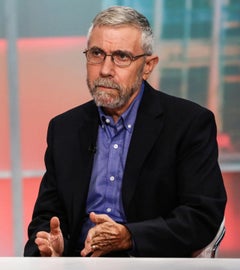MI SELECCIÓN DE NOTICIAS
Noticias personalizadas, de acuerdo a sus temas de interés

This is still true in much of economics. But in the areas that matter most given the state of the world, it’s not true at all. People who declared back in 2009 that Keynesianism was nonsense and that monetary expansion would inevitably cause runaway inflation are still saying exactly the same thing after six years of quiescent inflation and overwhelming evidence that austerity affects economies exactly the way Keynesians said it would.
And we’re not just talking about cranks without credentials; we’re talking about founders of the Shadow Open Market Committee and Nobel laureates.
Obviously this isn’t just a story about economics; it covers everything from climate science and evolution to Bill O’Reilly’s personal history. But that in itself is telling: Academic economics, which still has pretenses of being an arena of open intellectual inquiry, appears to be deeply infected with politicization.
So what should I and similarly minded economists do?
I see three choices:
1. Continue to write and speak as if we were still having a genuine intellectual dialogue, in the hope that politeness and persistence will make the pretense come true. The trouble with this strategy is that it can end up legitimizing work that doesn’t deserve respect - and there is also the tendency to let your own work get distorted as you try to find common ground where none exists.
2. Point out the wrongness, but quietly and politely. This has the virtue of being honest, and useful to anyone who reads it. But nobody will.
3. Point out the wrongness in ways designed to grab readers’ attentions - with ridicule where appropriate, with snark and with names attached. This will get you read. It will also get you some devoted followers, and a lot of bitter enemies. One thing it won’t do, however, is change any closed minds.
Is there a reason I go for door No. 3, other than simply wanting to tell the truth and have some fun while I’m at it? Yes - because the point is not to convince Rick Santelli at CNBC or the economist Allan Meltzer that they are wrong, which is never going to happen. It is, instead, to deter other parties from false equivalence. Inflation cultists can’t be moved, but reporters and editors who tend to put out views-differ-on-shape-of-planet stories can be deterred at times if you show that they are lending credence to charlatans.
And this in turn can gradually move the terms of the discussion.
And the inflation-cult story is, I think, a prime example. Yes, you still get coverage treating both sides as equivalent - but not nearly as consistently as in the past. When Paul “Hyperinflation-in-the-Hamptons” Singer complains about the “Krugmanization” of the media - which have the impudence to point out that the inflation he and his friends kept predicting never materialized - that’s a sign that we’re getting somewhere.
Muchas de las grandes empresas, especialmente las que contratan con el Estado, siguen creyendo que sus problemas se solucionan haciendo lobby individual y fletando parlamentarios para las elecciones venideras
El Distrito debe tener en cuenta, no solo los costos unitarios, sino también las capacidades de infraestructura, la atención efectiva a las necesidades particulares de los entornos, y la composición poblacional en las localidades atendidas